Fri 01 March 2024:
Iranians on Friday are voting to elect members of the country’s parliament and the Assembly of Experts, with authorities urging people to come out in droves amid fears of low turnout.
More than 15,000 candidates are vying for 290 seats in the parliament (Majlis), while 144 candidates are running for the 88-member influential body that appoints the country’s supreme leader.
According to Iran’s Interior Ministry, the candidature of over 15,000 hopefuls was approved by the top vetting body, the Guardian Council, constituting almost 75% of applicants who registered.
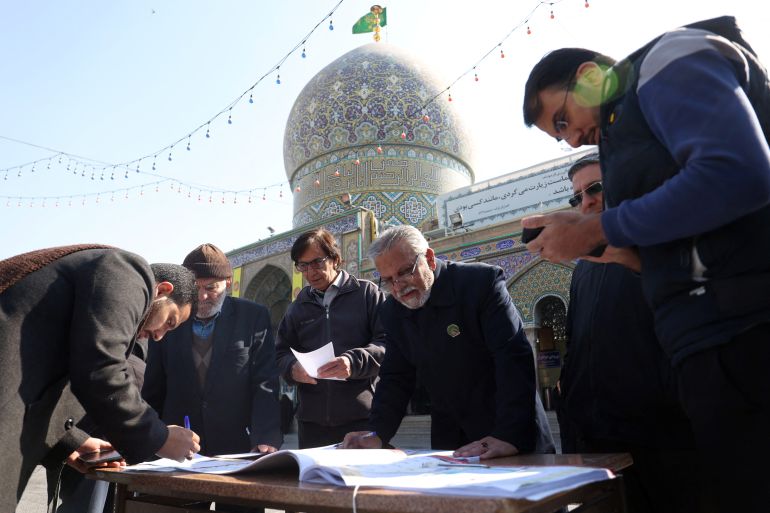
A polling station in Tehran [Majid Asgaripour/WANA via Reuters]
Of the total 87 million people in the country, more than 61 million are eligible to vote in the elections on Friday, four years after the previous election was held.
The last parliamentary polls were held in February 2020 when conservatives swept to power and ended the domination of reformists following the lowest turnout in the country’s history – 42.4%.
The voting came two days after the first cases of COVID-19 were reported in Iran, although soaring inflation, disqualification of some candidates, and other issues also led to the record low turnout.
The return of conservatives with a whopping 76.2% vote, compared to 6.9% of reformists, eventually paved the way for the election of Ebrahim Raisi as the new president a year later.
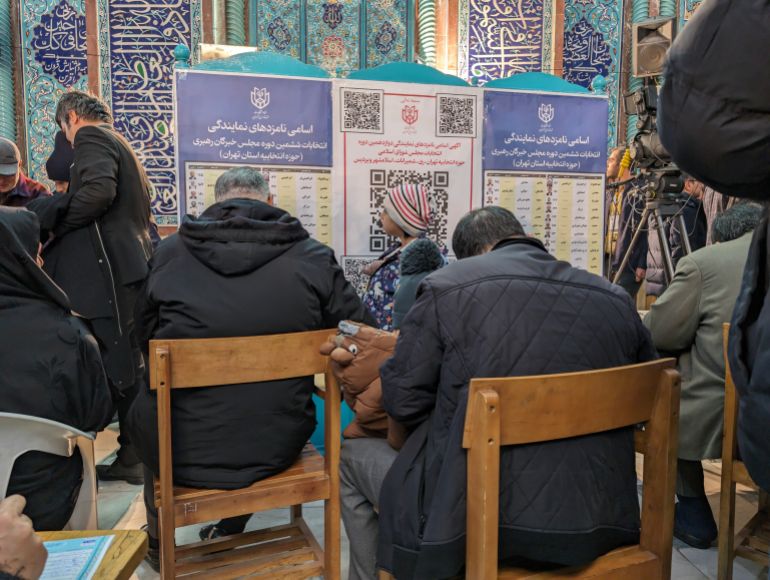
Voters at a polling station in Tehran [Maziar Motamedi/Al Jazeera]
The 2021 presidential elections saw a turnout of 48.8%, significantly down from 85% in 2009.
The minimum age for voters in Iran is 18 years, which means 61.2 million people are eligible to exercise their voting rights on Friday at around 60,000 polling booths across the country, including 5,000 in the capital Tehran, and 6,800 in cities on the outskirts of Tehran.
The voting lines opened at 8 a.m. local time (0430GMT) and will end at 6 p.m. (1430GMT), which is subject to extension based on voter demand as seen in previous elections.
Hadi Tahan Nazif, the spokesman for the Guardian Council, at a news conference in Tehran on Wednesday said 52 candidates would be running for each parliamentary seat across the country.
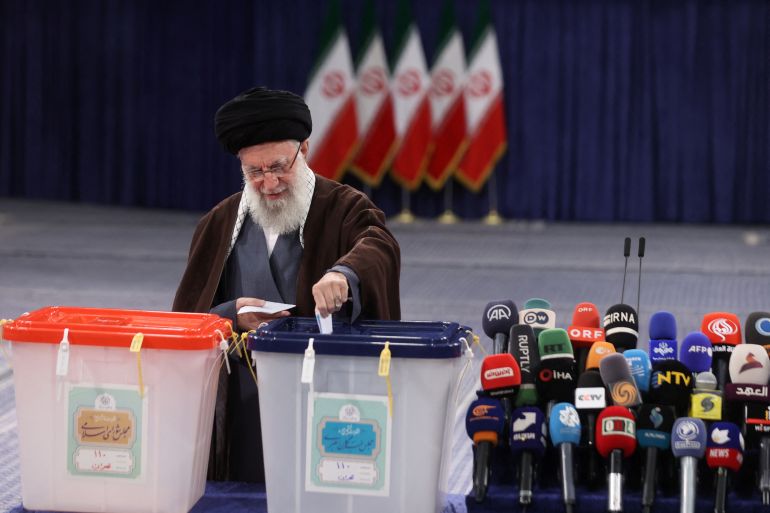
Iran’s Supreme Leader Ali Hosseini Khamenei casts his vote in Tehran [Majid Asgaripour/WANA via Reuters]
He said around 230,000 independent observers, 800,000 employees of the Interior Ministry, and 62,000 representatives of candidates would be present at the polling stations to monitor the vote.
A total of 250,000 security personnel would also be deputed at the polling stations across the country to ensure security and law and order, the spokesman added.
The record number of candidates running for the parliament this year launched their election campaign last week. However, the alliances announced so far are dominated by conservatives.
Reformists have not announced any alliance this time, calling it a “non-competitive” election, but some reformists have joined hands in an attempt to challenge conservatives and hardliners.
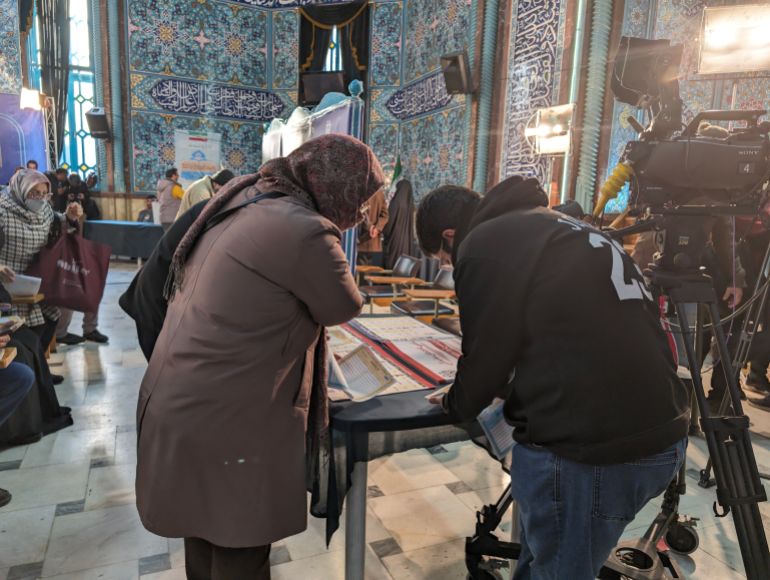 [
[
Maziar Motamedi/Al Jazeera]
According to observers, Mohammad Baqer Qalibaf, the incumbent parliament speaker, is most likely to retain the chair with his 30-member alliance, most of them from the conservative-hardline camp.
Supreme Leader Ayatollah Ali Khamenei, in a recent speech, called for massive participation in Friday’s elections, describing them as “the main pillar of the Islamic Republic.”
“Everyone should note that fulfilling these duties and responsibilities is an act of jihad (holy war) in confronting the enemy because they do not want these duties to be fulfilled,” he said.
Voting for the 88-member Assembly of Experts, for which 144 contenders are in the fray this time, all of them senior members of the country’s powerful clergy, is also considered significant.
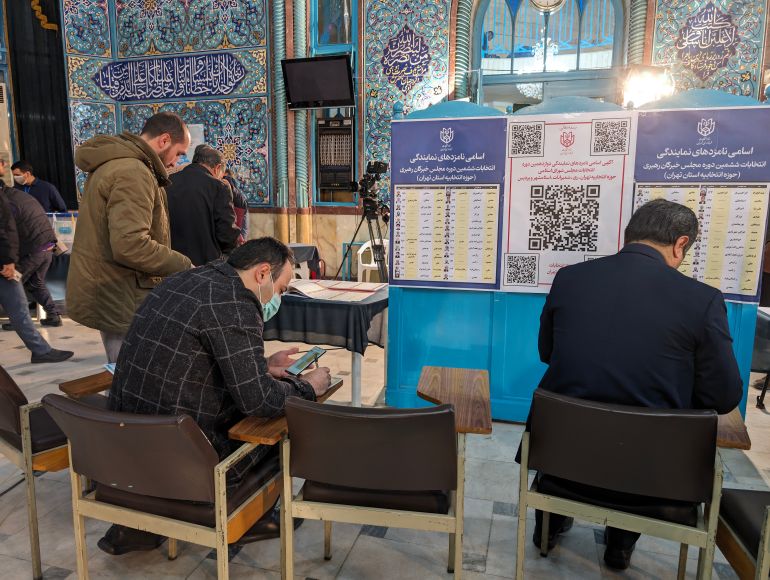
Voters at a polling station in Tehran [Maziar Motamedi/Al Jazeera]
The influential clerical body will be elected for the period of eight years. Most members (16) are elected from Tehran. The previous elections were held in February 2016.
Former Iranian President Hassan Rouhani was disqualified by the Guardian Council to run for the elite body tasked to appoint the supreme leader, the top-most political and religious authority.
This year’s polls for the parliament and the Assembly of Experts came less than two years after the deadly countrywide protests sparked by the death of a young woman in police custody.
The economic situation also remains precarious with inflation continuing to soar. This week, Iran’s national currency, riyal, touched an all-time low against the US dollar, jolting the forex market.
-Source: AA
______________________________________________________________
FOLLOW INDEPENDENT PRESS:
WhatsApp CHANNEL
https://whatsapp.com/channel/0029VaAtNxX8fewmiFmN7N22
![]()
TWITTER (CLICK HERE)
https://twitter.com/IpIndependent
FACEBOOK (CLICK HERE)
https://web.facebook.com/ipindependent
YOUTUBE (CLICK HERE)
https://www.youtube.com/@ipindependent
Think your friends would be interested? Share this story!





